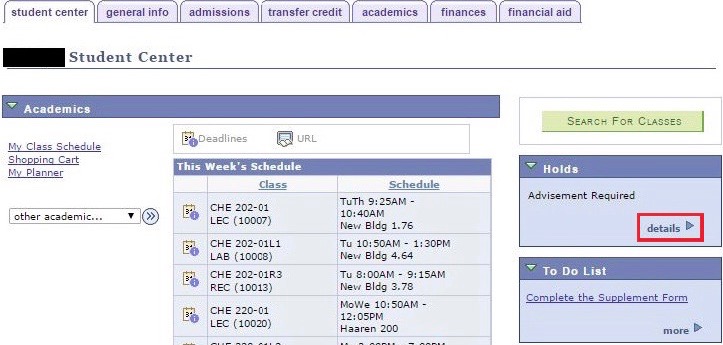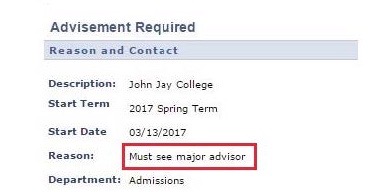Anthropology Major Resources
Here you will find:
- Key information about your major
- How and when to meet with your major advisor
- Planning tools that will help you track your progress in the major
- Ways to explore career opportunities related to the Anthropology major
Take a few moments to look at the information below. It will help you plan effectively and avoid surprises during your studies at John Jay. Please visit the Anthropology Department's website for information, resources, and opportunities!
Anthropology Requirements
You are responsible for the major requirements that were in effect when you declared the major. To confirm the requirements you should be following, go to the Undergraduate Bulletin for that academic year. For example, if you declared the Anthropology major in Fall 2015 or Spring 2016, you would click on the 2015-2016 Undergraduate Bulletin. If you declared the major and then left the College for more than one full semester, you’re responsible for the major requirements in effect when you return, if they have changed. Not sure when you declared the major? Find out here.
Below, find the Undergraduate Bulletin that was in effect when you declared the major.
- 2024-2025 Undergraduate Bulletin- ANT
- 2023-2024 Undergraduate Bulletin- ANT
- 2022-2023 Undergraduate Bulletin- ANT
- 2021-2022 Undergraduate Bulletin- ANT
- 2020-2021 Undergraduate Bulletin - ANT
- 2019-2020 Undergraduate Bulletin - ANT
- 2018-2019 Undergraduate Bulletin - ANT
- 2017-2018 Undergraduate Bulletin - ANT
- 2016-2017 Undergraduate Bulletin - ANT
- 2015-2016 Undergraduate Bulletin - ANT
- 2014-2015 Undergraduate Bulletin - ANT
Major Advising
Anthropology major advising during Fall 2024 can be done either remotely or in person. Anthropology majors should email Professor Shonna Trinch (strinch@jjay.cuny.edu) with any questions, and she is happy to arrange for zoom advising meetings if desired.
Major/Minor Advisor:
Prof. Shonna Trinch
strinch@jjay.cuny.edu
646-557-4403
NB 9.63.15
Once you’ve declared the major, Prof. Trinch may send you emails several times a year, with information about the courses available in the upcoming semester, to guide your registration choices. You will also be signed up for the departmental listserv to keep you in touch with internship opportunities around the country, summer courses abroad, and special departmental events.
When you meet with Professor Trinch (which you should plan on doing at least once a year), you can get advice about which courses you should take and when you should take them—advice particularly relevant to first and second year students. Prof. Trinch can alert you to new or experimental courses the department may be offering, possible participation in field schools or in departmental research and writing projects. She will suggest how you can tailor your program to your specific interests. If you are a third or fourth year student, she can offer advice about career paths or graduate schools and help with applications.
Anthropology students who would like advising during Summer session (June 3- August 27) 2024 can email Professor Shonna Trinch (strinch@jjay.cuny.edu). She will only advise remotely this summer.
Sophomores with 45-59 credits may have a hold on their registration. The hold will be removed when they have a major advising appointment with Professor Shonna Trinch (strinch@jjay.cuny.edu). This discussion will encourage wise planning and allow students to ask any questions they may have about the major. How do you know if you have a major hold? Go to CUNYfirst and complete the following steps:
- Check the Holds box of your CUNYfirst Student Center. If "Advisement Required" appears, click on “details.”

- Click on “Advisement Required.”

- See which type of advisement you need. If you must see a major advisor, then make a major advising appointment following the steps preferred by this department.

Plan Ahead: Graduate on Time
The Anthropology major has several courses that build on each other in a sequence, so it is important to be aware of this and plan accordingly. Keep the following guidelines in mind:
- Take ANT 101 as soon as possible, since it provides an introduction to the field of anthropology and is a foundation for many courses in the major.
- The Anthropology major no longer requires STA 250, as of Fall 2018. If you declared Anthropology before Fall 2018, you can choose to re-declare the major at Jay Express under the new requirements, or Professor Trinch can discuss a course substitution for STA 250 if you choose to stay with the pre-Fall 2018 major requirements. If you choose to re-declare, you can write "re-declaring the major to follow the new requirements" on your declaration form, to avoid Jay Express confusion.
- Many of the major’s core courses are offered only once a year and have only one section. Make sure to take them when they are offered or you may have to wait another year for them to appear again. Consulting with Professor Trinch before each registration period will keep you on track.
- Be aware that ANT 305, ANT 325, and senior standing (at least 90 credits earned) are all prerequisites for the Senior Seminar in Anthropology (ANT 405).
- For third and fourth year students with good GPAs and well-defined interests, there is the possibility of pursuing independent study with a professor.
- Remember that you will need at least a 2.0 GPA in the major and at least a 2.0 overall GPA to graduate.
- DegreeWorks degree audit - Use this online planning tool to track your overall progress toward graduation. You will see which of your general education and major requirements are completed, in progress, or still needed. Refer to the DegreeWorks FAQs to better understand how to use this helpful tool. Note: Confirm the accuracy of your degree audit with a general advisor and with Professor Snajdr (the Anthropology advisor), since there are important curricular options not presented in the degree audit.
- Fill out the Anthropology Major Checklist for students who declared before fall 2018 or the Anthropology Major Checklist for students who declared fall 2018 or later to keep track of which major requirements you have completed and which ones you still need.
- Sample Four Year Plan - See an example of how you could complete all your degree requirements (major, general education, electives) and graduate in four years! Remember that this sample plan shows just one possible way to combine your requirements. Transfer students in particular should work with advisors to determine a plan that works best for them.
A General Academic Advisor will confirm what general academic requirements you still need, make suggestions about smart course planning that will help you graduate without delays, discuss your interest in adding a minor or second major, inform you about opportunities such as study abroad, discuss general questions and concerns, and make helpful referrals. Visit the Academic Advisement Center's webpage for more information.
ANT and Careers
Recently graduated Anthropology majors and Anthropology minors have used the skills they have learned—an understanding of culture and cultural difference, the ability to observe carefully, to ask probing questions and to think critically about social issues--to begin satisfying careers. Our Anthropology alums are happily employed as social workers, teachers, city workers, and employees of community and social service organizations, to name just a few of their career paths. For many alums, the common thread is a commitment to improving their communities and their city—an outlook fostered by their years in Anthropology courses. Listen to Professor Ed Snajdr talk about the Anthropology major and how it prepares students for the professional world, whatever their career goals may be.
Although “becoming an anthropologist” requires long and expensive graduate training and a fierce struggle for a handful of academic jobs, many of our graduates have found the Anthropology BA to be an excellent pathway to law school, as well as to graduate programs in public health, urban planning, public policy and business.
Professor Trinch, the Anthropology major advisor, is happy to offer advice and help with applications. Also refer to the Anthropology Department’s Career Page for career-related resources and opportunities.
John Jay’s Center for Career and Professional Development is another great resource for questions related to job searches, internships, and career preparation. CCPD staff are available to meet individually with students and alumni in L72.00 New Building. To request a 45-minute counseling appointment, log on to John Jay Careers Online. 15-minute drop-in sessions are also available Mon-Fri 9 a.m. - 5 p.m. Stop by in person earlier the same day to schedule a drop-in session.